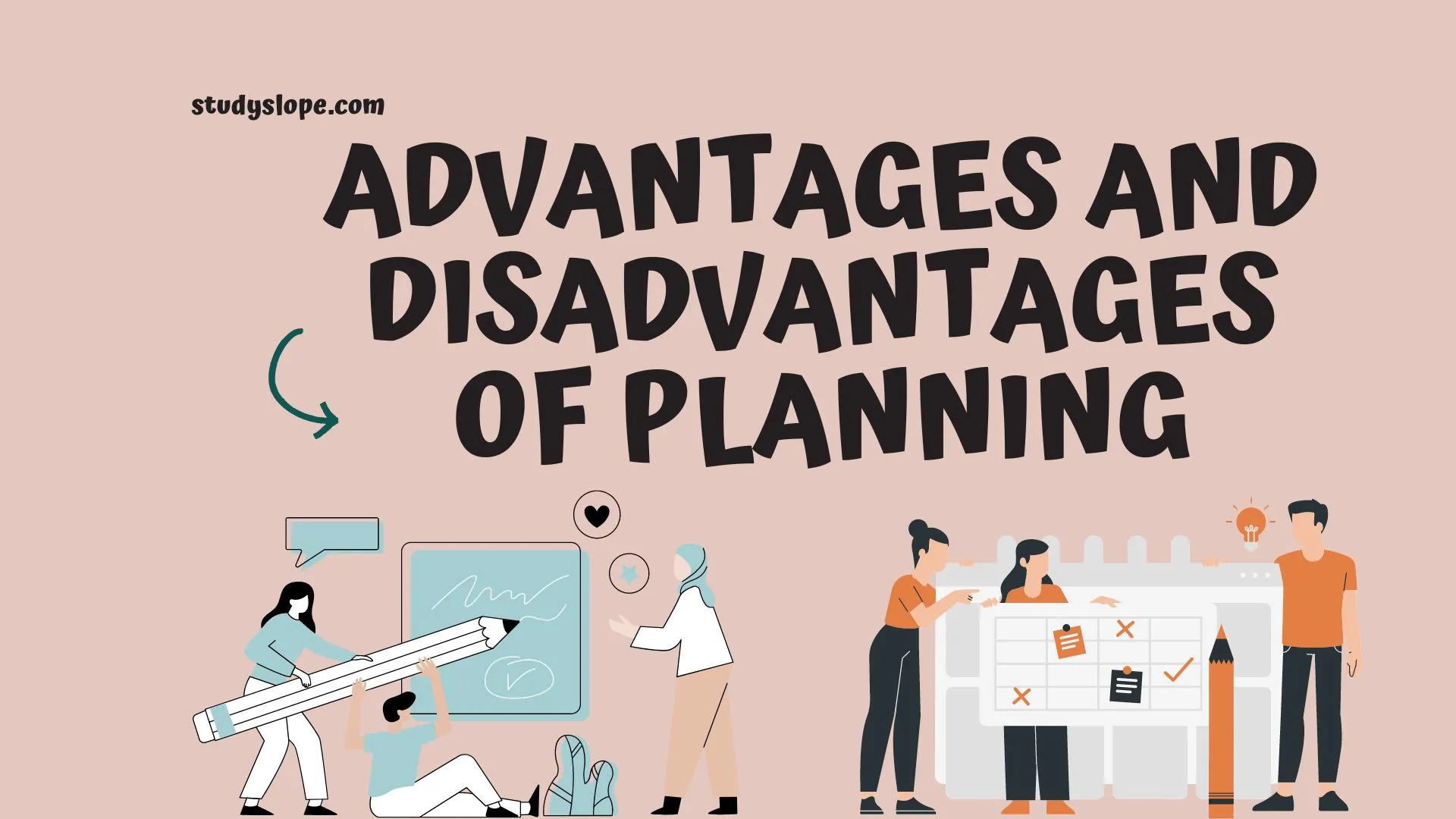What is Planning?
The process of setting targets, developing strategies, and specifying the activities necessary to accomplish those goals is known as planning. It is an important managerial function that assists organisations in achieving their goals. However, planning, like every other management activity, has advantages and pitfalls. In this blog, we will go through the advantages and disadvantages of Planning in depth.
What are the Advantages and Disadvantages of Planning?
Lets have a look at some of the advantages and disadvantages of planning.
Advantages of Planning:
- Provides Direction:Planning gives the organisation a feeling of direction. It aids in the definition of the organisation’s goals and objectives, as well as the measures necessary to accomplish those goals. As a result, staff are better able to focus on their responsibilities and work towards the organisation’s goals.
- Enhances Efficiency: Planning assists in increasing organisational efficiency. Planning reduces waste and duplication by detailing the procedures necessary to attain the organisation’s goals. It guarantees that resources are used effectively and efficiently, which leads to higher production and profitability.
- Facilitates Decision Making: Organizational decision-making is facilitated by planning. Planning assists managers in making educated decisions that are in keeping with the organisation’s aims and objectives by providing a framework for decision-making. It also aids in anticipating problems and taking remedial action before they escalate into serious concerns.
- Reduces risks: Planning aids in the reduction of hazards in the organisation. Planning helps to reduce the effect of unanticipated occurrences by anticipating difficulties and establishing ways to cope with them. It also aids in identifying and capitalising on possibilities, leading in enhanced profitability and growth.
- Encourages Innovation: Planning promotes organisational innovation. Planning promotes creativity and new ideas by setting ambitious goals and encouraging staff to think creatively. As a result, the organisation is able to remain competitive and adapt to changing market conditions.
Disadvantages of Planning:
- Time-consuming: Planning can take time. A complete strategy takes a significant amount of time and work. This might be difficult for organisations under pressure to generate outcomes rapidly.
- Costly:Planning may be expensive. Creating a thorough plan necessitates a significant investment of time, money, and experience. This might be difficult for organisations with few resources.
- Planning can be inflexible: Planning may be rigid. It might be difficult to depart from a strategy after it has been devised. This might be difficult for organisations that operate in dynamic, ever-changing contexts.
- Planning may result in overconfidence: Planning may result in overconfidence. Organizations may get complacent and believe that everything will proceed as planned. This is a risky assumption since it may lead to a failure to predict and respond to unexpected occurrences.
- Planning may lead to insignificant detail: Planning may lead to unnecessary detail. Organizations may grow engrossed in the plan’s intricacies, losing sight of the broader picture. This can be difficult for organisations that must be adaptable and responsive to changing market conditions.
Comparison Table for Advantages and Disadvantages of Planning
The below table compares the Advantages and Disadvantages of Planning:
| Advantages of Planning | Disadvantages of Planning |
|---|---|
| Provides direction | Time-consuming |
| Enhances efficiency | Costly |
| Facilitates decision-making | Can be inflexible |
| Reduces risks | May lead to overconfidence |
| Encourages innovation | May result in unnecessary detail |
Frequently Asked Questions:
Q: What are the advantages of planning?
A: Planning may assist organisations in achieving their objectives, improving decision-making, increasing efficiency and effectiveness, improving coordination and communication, and encouraging innovation and creativity.
Q: What are the disadvantages of planning?
A: Planning may be time-consuming and costly, leading to rigidity and inflexibility, creating resistance to change, being undercut by unforeseen occurrences or environmental changes, and resulting in unduly optimistic expectations.
Q: How can businesses avoid the possible disadvantages of planning?
A: Organizations may employ flexible and adaptable planning methodologies, include stakeholders in the planning process, monitor and assess progress on a regular basis, allow for contingency planning, and build a culture of learning and experimentation.
Q: How can planning help an organisation succeed?
A: Organizations may benefit from planning by aligning their resources and activities with their goals, anticipating and responding to changes in their environment, making educated and timely decisions, and continually improving their performance.
Conclusion:
To summarize, planning is an important management activity that assists organisations in meeting their goals and objectives. It gives direction, improves efficiency, makes decision-making easier, eliminates risks, and promotes innovation. However, there are certain drawbacks to planning. It may be time-consuming, expensive, and rigid, and it can lead to overconfidence and needless detail. To guarantee success, organisations must weigh the Advantages and Disadvantages of Planning.
Also Read:

